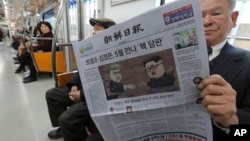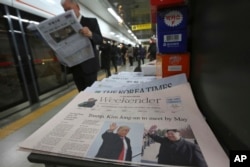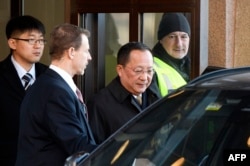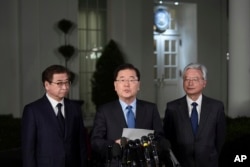Diplomatic efforts are intensifying to coordinate the logistics and agendas for expected North Korea summits with South Korea and then with the United States, to work out a deal to end the North’s nuclear weapons program.
North Korean leader Kim Jong Un opened the door to nuclear disarmament talks by agreeing to an inter-Korean summit with South Korean leader Moon Jae-in, and extending an invitation to meet with U.S. President Donald Trump.
Kim agreed to discuss ending his country’s threatening nuclear arms program which, in the past year, has accelerated efforts to develop an intercontinental ballistic missile (ICBM) that could target the U.S. mainland, and to hold off on further provocative weapons testing while talks are underway.
North’s silence
President Trump’s decision to agree to denuclearization talks by the end of May caught allies and adversaries by surprise. The Trump administration, however, has said that its hard-line "maximum pressure" campaign would remain in place until a deal is reached. Under Trump, the U.S. has led international efforts to impose increasing economic sanctions on the North and has stressed that military action is also a viable option to end the growing nuclear threat.
North Korea has not yet confirmed its participation in either summit, but South Korean Foreign Minister Kang Kyung-wha said on Sunday that the leadership in Pyongyang is still trying to formulate its response to Trump’s sudden embrace of diplomacy.
"I think we were all quite surprised by the readiness of that decision. I think it was an extremely courageous decision on the part of President Trump. We believe the North Korean leader is now taking stock," said Foreign Minister Kang during a television interview in Washington with CBS’s Face the Nation.
The South Korean foreign minister is not troubled by the fact that Kim Jong Un’s commitment to engage in denuclearization talks has so far only been communicated through a high level South Korean envoy who met with the North Korean leader.
"The significance of his word is quite weighty in the sense that this is the first time that the words came directly from the North Korean supreme leader himself, and that has never been done before," said Kang.
Diplomacy
Another indication that a U.S./North Korea summit is in the planning stages is that North Korean foreign minister Ri Yong Ho visited his Swedish counterpart Margot Wallstrom over the weekend for security talks. Ri’s visit has generated speculation that Stockholm may host the Trump/Kim summit. Many analysts say Trump should seek a neutral summit site for both leaders to be on equal diplomatic footing, and to withhold a U.S. presidential visit to Pyongyang, one that would greatly enhance the legitimacy of the Kim government, until after significant denuclearization concessions are made.
South Korean media also reported that there was progress made toward releasing three Americans being held in custody in North Korea during the talks in Sweden.
In San Francisco over the weekend, top national security advisers from the United States, South Korea and Japan also met to discuss the "complete denuclearization of the Korean peninsula," according to South Korea's presidential Blue House.
U.S. National Security Adviser H.R. McMaster met with South Korea's National Security Office chief Chung Eui-yong and Japan's National Security Adviser Shotaro Yachi to focus on the expected April inter-Korean summit between Moon and Kim and the Trump/Kim summit in May.
The security advisers agreed to work together closely and "not repeat the mistakes of the past," according to a Blue House official.
The U.S. has not yet commented on the weekend meeting in San Francisco, but President Trump has been critical of deals made by past U.S. administrations that provided economic incentives to North Korea for pledges to dismantle its nuclear facilities that in the end were not kept.
Foreign Minister Kang agreed that there would "be no reward for dialogue" during her interview on Sunday.
Denuclearization groundwork
Officials in South Korea are making denuclearization a main focus of the inter-Korean summit, and hope to use the meeting between Moon and Kim to lay the groundwork for a possible deal that Trump can support.
North Korea could offer some immediate concessions that could demonstrate good faith without significantly reducing its nuclear capabilities.
"North Korea could offer to limit the number of missiles it is going to build and possess, which is very costly to them anyways to maintain, and ultimately they could limit the amount of nuclear material they have on hand," said Go Myong-Hyun, a North Korea analyst with the Asan Institute for Policy Studies in Seoul.
But the question remains what concessions the U.S. and South Korea might offer Pyongyang in exchange for an intermediate nuclear reduction step. The leadership in Pyongyang has reportedly been motivated to strike a deal in large part to ease the harsh U.S. led sanctions that are inflicting real economic pain.
Also this week the U.S. and South Korea are expected to announce that their combined military exercises will resume in April. The joint drills were postponed during the winter Olympics held in the South.
The resumption of the military exercises is not expected to raise regional tensions, as the North Korean leader has reportedly dropped his opposition to the joint drills, at least for now, to facilitate diplomatic talks.








